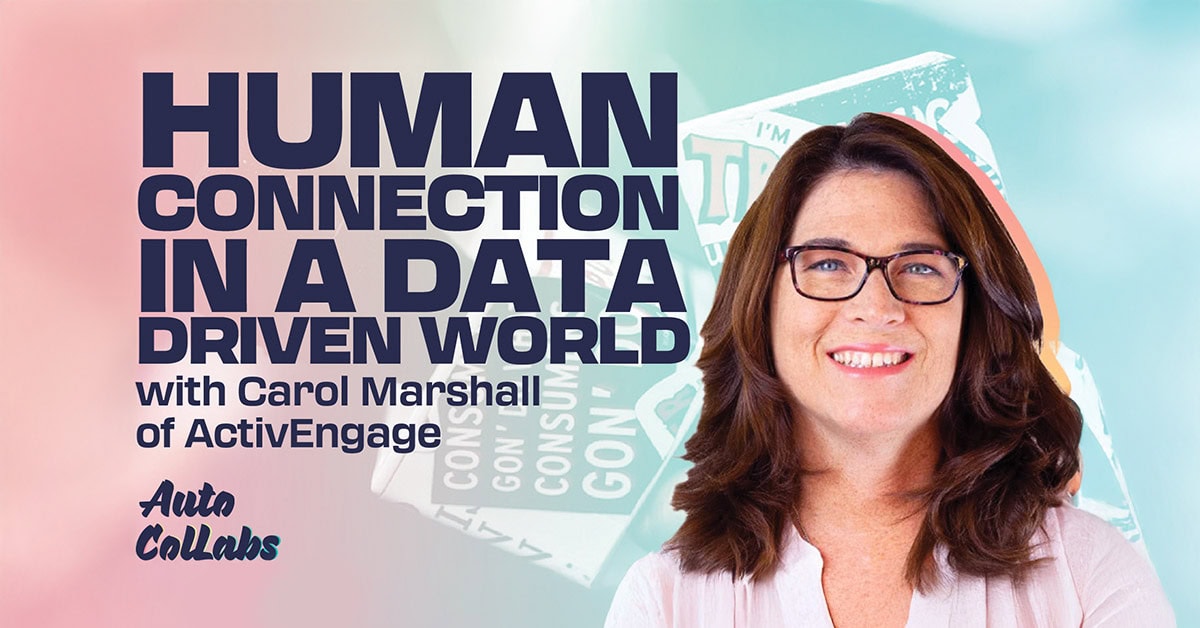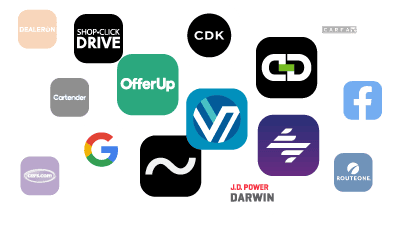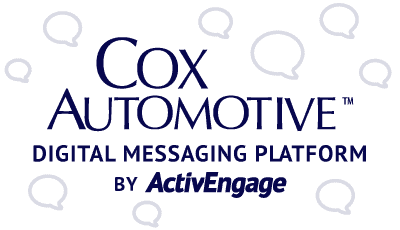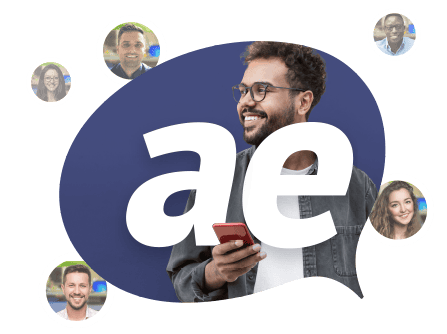Revolutionizing Automotive Conversations: Insights from Carol Marshall of ActivEngage
In a compelling episode of Auto Collabs, Paul J. Daly, Kyle Mountsier, and Michael Cirillo welcomed Carol Marshall, a key leader at ActivEngage, to discuss the future of automotive retail. The conversation spotlighted ActivEngage's commitment to blending cutting-edge AI technology with live interaction to create meaningful customer experiences.
Key Highlights
- Human-Centric AI with ActivEngage: Carol introduced "Theo," ActivEngage’s AI-powered digital assistant designed to enhance the efficiency of human agents. By supporting—not replacing—human interactions, Theo helps ensure a seamless and personalized customer experience for automotive dealers.
- Proven Results: ActivEngage’s approach to live, human-led interactions leads to significantly higher automotive service appointment show rates and increased revenue per repair order, outperforming fully automated solutions.
- Centralized Communication: Carol emphasized the importance of creating a unified platform for all customer interactions, enabling automotive dealerships to effectively manage data and deliver on customer expectations.
Looking Ahead to 2025
Carol shared her vision for the industry's future, predicting a greater focus on education, streamlined processes, and a return to authentic customer service. ActivEngage aims to drive this shift by leveraging its expertise in live conversations and customer engagement to help dealers build trust, foster loyalty, and increase revenue.
This episode underscores how ActivEngage is redefining automotive communication by combining innovative technology with a personal touch—proving that meaningful conversations are at the heart of dealership success.
Don’t miss the full episode to learn more about ActivEngage’s vision for 2025 and how they’re shaping the future of automotive retail!
Michael Cirillo:
0:00 Sorry, I wasn't listening to any of that.
Unknown:
0:07 This is Auto Collabs. I feel
Paul J Daly: 0:10
like we can relate. Maybe your your wife feels the same way we do right now. Wow,
Unknown: 0:16
that is
Kyle Mountsier: 0:20
back up. Hey.
Paul J Daly: 0:22
Speaking of that. Did you guys notice? I mean, we wear a lot of black, but today we really have a lot of black. We
Kyle Mountsier: 0:27
are really in that vibe, for sure. Really
Paul J Daly: 0:30
gets cool. We're in the midst. We're in the midst of this kind of, like, we're gonna announce a lot more about it soon, but in the midst of this, like, reinvention of, like, the more than cars, media network, yeah, and I feel like this is we're channeling that right now.
Michael Cirillo: 0:44
Yeah, you so aptly and promptly point out when I'm not wearing black, and I will have to admit I'm grateful for that, because I when I'm not wearing black, I feel like I've lost a bit of my identity.
Kyle Mountsier: 0:57
I don't know what happens, guys, I have a purple, like a, like, tethered purple, like, pull over thing that I wear, like, I don't know, a few times a year. I think I've actually seen this. It's like mine. I know my kids call it my Easter shirt, like
Paul J Daly: 1:21
you wear that at Easter. I try. I don't know. It just feels wrong. I
Michael Cirillo: 1:26
gotta say something. I don't know how many of these we've done now, dozens and dozens. Oh yeah, I'm just noticing that the framing of both of your shots are so clean it actually looks like you're sitting side by side in the same office. Which
Paul J Daly: 1:43
way am I looking like? Where do I have to look like because
Michael Cirillo: 1:47
you've got the bookshelf with Steve Jobs, and your bookshelf has black lines, and then the black line and streamyard that separates the
Paul J Daly: 1:58
purple, look is kind of the same, which is great if I reach over right now and I pull the guitar off frame, right? Yeah, you
Kyle Mountsier: 2:05
need to
Michael Cirillo: 2:08
do this. You need, like, a bookshelf separating me because I'm on the bottom, to make it look like I'm under the one. That's all weird. I think, I think this
Paul J Daly: 2:17
is exactly why people tuned into this podcast today. That's
Kyle Mountsier: 2:19
exactly I don't want to talk about to hear smart things. Oh, sometimes, well, that's why we
Paul J Daly: 2:24
have guests. That's why we have that's why we have guests today. Carol Marshall, longtime friend, we get to have a conversation with her, with her again, about, you know, I'm sure we're gonna talk about AI. We're gonna talk about all the things. They've been on the cutting edge of that for a long time now. So hope you enjoy this conversation with our friend Carol Marshall. Carol, it's so good to spend a few minutes with you again. I feel like it's been too long. Yes,
Carol Marshall: 2:52
thank you. Thanks. Excited to talk to you guys again, especially this time of year, so many exciting things coming up, so I appreciate the time. Yes,
Paul J Daly: 3:00
this is great. So there's this one like, we always send out before these shows, we're like, hey, what? What are you thinking about? You know, what? What's fun? And you said you wanted to start the grandparents in Automotive Group, yes, and that that just got me in the fields because I've been joking that I'm in I have my grandpa vibes today. I got my cardigan, I got a candle lit over here. Tell us about your big plans for the GIA. Yeah,
Carol Marshall: 3:26
the GIA of the automotive
Kyle Mountsier: 3:30
Yeah. How about it? So
Carol Marshall: 3:32
it's so funny. I had my first grandchild at the end of May, and then at the most recent V 20 meeting, we were sitting around the room best personal, professional moment, and so many others became grandparents this year. And just when you hear all of us gush and go on and on and then and then later, when you're in business conversations, you're like, there is definitely wisdom that comes from being two steps away so you see your product now working on the next product, and you're like, Oh, I now I, yeah,
Kyle Mountsier: 4:11
you're watching it. You're like, Wait, was I? No, I never did that. There's no way I did that. Yeah.
Carol Marshall: 4:17
You did yeah thing, yeah. You know, it's
Paul J Daly: 4:22
funny. Well, at the fact that it's three letters means Brian Pash will get really excited about it, the acronyms in automotive, but I do, I actually do, think that's a great idea. I've been thinking about this concept of parenting lately, and not even if you don't have children of your own, the fact that there's this element of parenting, and, you know, in business, we call it mentoring, but a lot of times it's actually parenting, yes, you know. And so I think the grandparents in auto, I'd be a full booster of that group if you get it going, even though I'm not a member yet. But I aspire to be a member of that group.
Carol Marshall: 4:57
We can't fail with that kind of. Support when,
Kyle Mountsier: 5:01
you know, I think, okay, you said something, and you said product, but it actually kind of relates to, obviously, what we think about, when we think about the things that are available to auto retailers to enhance their business, and, you know, seeing what you make and how it interacts with the next thing is, is a lot of times extremely important in business. So I can see how like relating that, especially in the vendor 20 groups. And as a vendor, your yourself or a partner to dealers, there's like the product that you sell, but then there's the product that it creates, whether in business efficiency or interactivity or the way that a dealer works with it, like, maybe extrapolate how you've seen the similarities in like, being a grandparent and like, learning how to, like, take the go the next level with a grandchild as as, as compared to like, yeah, we have this product, but it has another layer to it. Yeah.
Carol Marshall: 6:00
I love that question. Wow, that's magical. Kyle. It's almost like I didn't give you that question, but that's a great question. I mean, we've been doing what we do for 17 years, and it's all about the conversation. It's about the people. It's unscripted, right? And so that's our child. And so now you look around and you're like, What are other people's kids and and how do we relate those together to make real magic for dealers, for our customers? And one thing that struck us here is we know conversations. We know how to build trust with shoppers so they schedule that service appointment or buy that car. But what are other vendors doing? What are other businesses, you know, CDP, there's a great three letter acronym.
Kyle Mountsier: 6:52
It's making its way around, you know. So
Carol Marshall: 6:55
CDPs are great at collecting first party data, and then they can segment it in different audiences. Great. Now, dealers have a list they can market. They can have a marketing agency market to it, whatever we're in the process of launching in a week or two, with a third party site where they get the contact, but then that comes to us to foster that relationship, build trust, and really make that an opportunity and hopefully an appointment for the dealer. And so when you think about CDPs and their segmented audiences, who better to have a campaign go out and have those responses come to but us, that's what we're accustomed to doing, and so now we're not just having conversations, the first conversation on someone's website, which is vitally important, but let's say, for those shoppers that had to push that that purchase a month or two or three, now they're coming back into conversation, and We can get back into what's important to them, what's their timeline, what's their situation, send them that integrated digital retailing, link with all the different partners that we have, and really get them on the road to making that purchase and and I think that's kind of our grandchild, if you will, and where we're going to be focused in 2025 is, how do we lend our processes and our people to these other entities in the industry so that the ultimate winner is the dealership and the consumer who can feel good about revisiting that decision, maybe that they thought they had to put off.
Paul J Daly: 8:39
Now let's talk. I think, I think the concept of a lead coming in and being handled by some level of automation or AI is just like you can't walk half a step without having someone talk about it or present a solution for it. And the reality is that very little, if any, AI is ready to handle an entire thing, right? It has to be babysat. It has to be, I mean, people who try to deploy set it and forget it, right? Everything feels gross about it, right? It feels spammy. It feels the customer experience actually goes down the data shows. So, I mean, what are your thoughts on that? Because, obviously, you've always been this very like, personal type minded company, and the way you deploy technology, you've kind of been on the cusp. But like, what are your thoughts toward how people are deploying AI right now, and just in general, the level of babysitting it needs?
Carol Marshall: 9:34
It's really ooky. What did
Paul J Daly: 9:36
you just say? What was that word? Ooky? Very ooky. Ooky.
Carol Marshall: 9:41
So I go on dealers websites, and they have an AI solution for messaging and the first box that comes out. May I have your first name, last name, email and phone number. Can you imagine doing that on on your dealership showroom floor? Like, why are you doing that? That that makes me want to pull. My hair out. The second thing is, we've been working in our own AI product space for a year now. Something super interesting is AI cannot count so and when you think about AI is, for the most part, large language models. It makes sense, but AI can't say two plus three is five. It doesn't understand that. It can say there's several, or there's many, but to get a precise number, so the AI we've worked on is called Theo. It's a digital assistant for our agents, and we wanted it to be able to come back and say, we have five Ford explorers that would fit your needs, but it can't get the number right. So it can come back and say, we have several, or we have this one for our agents. And that is helpful. It's signed
Paul J Daly: 11:00
- When you say agent, you mean a person,
Carol Marshall: 11:03
yes, okay, human, it helps our humans. Human,
Paul J Daly: 11:06
agent, yeah, I know. Because now, yeah, now AI agents, like,
Carol Marshall: 11:10
right, our AI is actual individuals.
Paul J Daly: 11:13
Ai, actual individual. I love that. It helps our
Carol Marshall: 11:16
humans, save time, and so I love AI for that, there's several different little ways it is an assistant to our humans. And that's, it's still not a set it or forget it. Oh my gosh, it's if you're AI is no more set it and forget it than a human is. If you can imagine hiring someone, sitting them at your front desk and never giving them another liquor training, you would never, ever, ever dream of doing that. Well, a lot,
Paul J Daly: 11:43
a lot of people know exactly what that's like. They do that. It's called turnover.
Carol Marshall: 11:50
Fair point, fair point. So, yeah,
Kyle Mountsier: 11:52
I mean, hopefully we're not doing like, like, the reason why you go from GPT three to GPT four to 402, to you know, each of these iterations and Gemini is constantly evolving. Like, it takes training more data, more refined data, more processes to understand how the data is coming in. You know, even things like understanding how to inspect the data. Like, yeah, you know, when you say, like, this is how many cars are available for you. I think that there's a there's a point that you can get to that. But it's like, recognizing the patterns in the data is also extremely important. Because, you know, when you look at like, the comparison was always made to, you know, purchasing anything in an E com scenario, right? And data structures that are a lot more limited, right when we're dealing with things like service appointments that have multi tiers of capacity rankings. And then you look at like, like a vehicle, understanding the data structure of a vehicle because it's been based and not skew based, totally changes how like that human has to introspectively understand what the AI is, is drawing out of the data at the end, you know, you, you were kind of alluding earlier to, like the conversation, and how, how we're how we're drafting the conversation and and I was actually, I wanted to talk to you about A little bit. I had someone on a LinkedIn post a few days ago say, like, we've got this massive overload of communication endpoints coming from our dealers and and what I'm hearing you say is, like, it's not just the data endpoints, but it's the type of communications, like creating a centralized place for all of that to happen, live and float in and out and be aware of, can you speak to how you're handling and how you're thinking about like the the single central communication point for every consumer interaction with a brand or dealer? Yeah.
Carol Marshall: 13:56
Look, company spends millions and billions of dollars on marketing, you know, from the OEMs all the way down, on branding and putting out some kind of customer experience promise. And then to just dump data points on these individual dealers, small dealers, large dealers, you know, depending on the size of their staff and the turnover that we just talked about, how in the world can they ever deliver on that? Meanwhile, if you have a partner who is established, who has the longevity in very specific types of conversations, you know what a treasure trove to take these data points and turn them into revenue, because at the end of the day, that's what the dealership is looking for, is increased share, increased CSI, increased revenue, and that's what we're focused on. We understand, we study these conversations like It's bananas. We have humans looking at the. Conversations, looking at the intonations and and what is going on in the marketplace at that time, and how the conversations may be changing. But we also now have the help and the aid of AI to highlight certain things, certain parameters we've put in place, also to bring up those conversations and help train the team. So what we're looking at for the future is data is wonderful. I love data. I'm actually a very data driven person, but, you know, love people as much as you love data is the thing. And loving, no,
Paul J Daly: 15:36
I'm just kidding, that'll get Kyle. He can do the cars, but the data thing's gonna trip them up.
Carol Marshall: 15:44
Loving your own team in store, you know, as well as loving that consumer that you've put this promise out, I remember, look, I was in a dealership when we first got our website, and then I had corporate saying you had 11 people on your virtual lot yesterday morning. That's incredible. Who were they? What did
Kyle Mountsier: 16:03
they look at? Unbelievable. 11 people. Can you imagine? Oh, wow,
Paul J Daly: 16:08
that's 11 opportunities. Well, you know, you mentioned the consumer. People are making purchases decisions in in a variety of ways, but collecting data in a way that considers how they're making decisions. How they learn, how they interact, is a big part of how you structured the data, how you ingested, how you you know, think about it. So from your perspective, walk us through how how people are interacting, how they are learning in this native environment.
Carol Marshall: 16:41
So I loved also your post recently, Kyle about websites are confusing. People don't know how to navigate automotive websites. Yeah,
Paul J Daly: 16:52
yeah. We automotive websites are confusing. A lot of
Carol Marshall: 16:57
they are and so you know, the way that people are interacting is they want that response. They want to know someone's with them on their little shopping journey. At the point that we're we're meeting them, whether that's on a dealer site or a third party site. You know, it's why social media is so big. And you've got to think about these generations. The largest purchasing generation are is millennials, and they grew up online, so they are online to do research, to find answers and to connect, and just reading a brochure that an AI thing spits out doesn't check the box for them. And so they're like, I just want to know this, or is this still available? They want a real time human answer. When we set a service appointment, it's a 30% higher show rate than when the consumer sets it in the scheduling tool themselves. That's
Unknown: 17:58
wild. Yeah,
Kyle Mountsier: 18:00
it's like you're committing to a person accountability, right? It's the accountability there, yeah,
Carol Marshall: 18:05
and it's a $60 higher ro
Kyle Mountsier: 18:08
on average. That's the crazy part. Wrong. We're asking
Carol Marshall: 18:13
about declined services. You know, to your point about looking in the service scheduling tool, it is a little con. Those conversations are usually 20 minutes long, and so of course, they're going to show up. They've just spent 20 minutes. That's a big investment for someone with your dealership. So people are navigating, well,
Kyle Mountsier: 18:33
what I think that's a practical thing that someone can take away from this is like, hey, why don't like, if, if the data shows that if customers communicate with a person and do that for X amount of time about their service appointment, higher show rates, higher dollars per ro like, get people more in conversations, whether it be phone calls or chats. When you're thinking about, like, scheduling service. Maybe prioritize that would you prefer to chat right now or schedule online, right? And more people are probably going to choose chat, and then you, like, increase the decision tree, point, push people more to it. Yeah, yeah.
Carol Marshall: 19:19
So our product, flip to text. People call into the dealership, and if they're on hold, they get the option go to three. It changes it into a text conversation, right? We set a service appointment. 90% of those conversations, and they're great conversations, and they go straight into the CRM and all the information. So now the dealers got all of all of the conversation right there for them. They've got their service appointment already scheduled. The service advisor doesn't need to call back. It's, it's been a huge product, too. Yeah,
Paul J Daly: 19:54
I think of that interaction, I just who was it? I was on a trip. I think maybe it was avis. And they did a really. Terrible job after I flipped to deck to text, because they flipped me to to a text that didn't have a human and it couldn't solve my problem at all. And so I had a call back, yeah, but, but I would, I'm taking the option to flip the text every time where I have to wait more than, like, a few minutes,
Carol Marshall: 20:18
of course, of course, it's like, Well, I tried to call but,
Paul J Daly: 20:22
well, and then you also talked about, so I'm, I'm right on the border. So I was born in 79 so I'm just, like, an older Gen Xer, but, but younger Gen X, you're an older Gen, I'm sorry, younger Gen X or older millennial. And so, like, I get both sides of it, and without a doubt, I would much rather not talk to someone right if you ever want to make sure I don't get a communication, leave me a voicemail right now, now, since Apple starts giving me the text of the voicemail in a message for even nice voicemails, talk slow enough, but, but I say it, no, it's way better now, but, But because even I even say it on my voicemail, right? Yeah, send me a text. Don't leave a voicemail. I might ever, never hear it, but whenever I have the opportunity to move to that, if it's a more standard question, and it's not like something that's in depth, I'm going that way. And I think today's consumers are just like you said, the millennials are buying the most things right now, and
Carol Marshall: 21:21
they are the biggest demographic. I'm bad because I have my phone said it doesn't even ring if I don't know your number, that's right, that's a great setting. And people text me though you're available. I'm like, sure give me a call. And then the phone didn't ring. And then I have to explain to
Paul J Daly: 21:36
I had it on for a long time, and then I turned it off because there were, like, a few that I I wanted, but I was getting so many spam calls that, yeah, I know if I reset it from from that point. So I know you said moving it, moving into 2025 right? You kind of have your heading. Where do you think we're going to be landing by the end of 2025 What is your vision for the shifts that the industry will make in the next 12 months? Because there's a lot in the air right now, and I think there will be several things that come to ground in the next 12 months. What do you think those things will be?
Carol Marshall: 22:07
I think education is going to be huge for our industry because of all of those shifts. I think education from the inside out, from within our dealership team, our sales professionals, our F and I professionals, I think all of them will be learning and getting better. I think processes will be tightened up. Has to be. I think everything old is new again. So, you know, customer service, customer experience. I think that I do. I hope I see like a bridge I've we're already seeing some customers who wanted to play in AI land, and it was shiny and fun and did not work out so well. And so for your AI only messaging on your site, I do think that will lose its luster a bit, because you you need those opportunities, and you need opportunities that drive revenue. Doesn't just drop name and number. Any anybody will drop their name and number, because, just like we explained, we don't have to answer the phone. So that's who cares. You got an email, you got a phone number. It doesn't matter. Do you have an opportunity where that person's willing and anxious and ready to do business with you. That's the focus. And that's, in my opinion, every dealer should be focused on that. Looking at your opportunities, that walk in, that call, that are online, you have to Yeah, Carol,
Kyle Mountsier: 23:38
that's a great exhortation as we end, thank you so much as always, like you're just brimming with excitement for the things that are like right on the horizon for auto and thank you and to your entire team for always challenging and pushing back and creating net new things that dealers and other industry partners can Be looking toward as opportunities and thanks for joining us here on Auto Collabs. Appreciate
Carol Marshall: 24:05
- Thanks for having me.
Paul J Daly: 24:10
All right, I like the RE, the juxtaposition of AI being actual individuals,
Kyle Mountsier: 24:16
yeah, well, and I mean, we know this at this point, especially because AI has definitely not gotten to the point of just like taking over jobs entirely, that like curation, the human interaction it is. It's important when an AI is involved, but it's even more important when a large purchase, like a car is involved, or a service where there's nuance and there's, you know, probably like feelings coming into it from the person, and you have to perceive them in real timely, like all the time, right, especially when it has to do a service. And so I think that any company that is like overlaying one with the other in real time is. Winning, right? Because you're creating efficiencies, but keeping that human, that human touch in so I'm grateful that companies like active engage are doing that
Michael Cirillo: 25:11
this, this, for me, is exactly why you tune into this show. It's to think ahead. It's to get ahead of the curve. Like, if you're in a position where you're still feeling overwhelmed by AI you said at first, Kyle, like taking over your job. This is the kind of conversation you need to be a part of. We have conversations like this all the time. You're going to see us wherever we are roaming around, whether it's nada or sodu con, these are the conversations we're having so you can get ahead of it, so that you're not worried about is AI going to take my job that you learn how to overlay it to create more efficiencies. And this actually, now that I'm thinking about it, this goes back to something we talked about months and months and months ago, which is the thesis that AI will not replace the work that requires a soul.
Paul J Daly: 25:58
I don't know. I don't think we can end
Kyle Mountsier: 26:00
any better than that ending, baby, come on now
Paul J Daly: 26:03
without a doubt, Nai, I definitely won't be able to be as foolish as the three of us. Podcast intros. So on behalf of com mounts here, Michael Cirillo and myself, as always, we thank you for joining us here on Auto Collabs.
Unknown: 26:18
Sign up for our free and fun to read daily email for a free shot of relevant news and automotive retail media and pop culture. You can get it now@asotu.com That's asotu.com if you love this podcast, please leave us a review and share it with a friend. Thanks again for listening. We'll see you next time you welcome to recording you.









